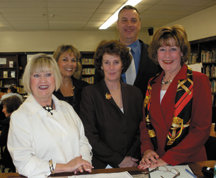When it comes to today’s economy, education is all about jobs, how to get one, and how to keep one once you have it.
This is one of the key lessons that came out of a teacher’s workshop held at Dr. Walter Robinson School in Bayonne on Nov. 23 in a program sponsored by the New Jersey Chamber of Commerce, in conjunction with the New Jersey Department of Education’s Office of Governance and School Leadership.
LearnDoEarn is a national program that gives students and their parents the information they need to make the best academic, behavioral, career, and financial decisions in middle and high school. Teachers in more than 200 schools in New Jersey are using the LearnDoEarn materials to motivate students to achieve at higher levels; set academic, behavioral, and career goals; and help them understand what they need to do in grades six to 12 to prepare for, and succeed in, college, work, and life. Participants will learn how the LearnDoEarn Student Achievement System can help them meet the new 21st century career and life skills standards, and can help students create more meaningful, personalized learning plans.
“It informs, motivates, and guides students as they navigate their way through high school and beyond.” — Dr. Patricia. L. McGeehan
________
“Predictions are that by the year 2020, 84 percent of available jobs will require some level of college, and 90 percent of the fastest growing jobs require more than a high school diploma,” explained Dana Egreczky, president of the New Jersey Business Coalition for Educational Excellence and LearnDoEarn. “Therefore, real workforce readiness equates to academic achievement. Yet in New Jersey, the community college graduation rate is only 13 percent at the three-year mark, and the state’s four-year institutions only graduate 53 percent of full-time students after six years. The research points to one reason: most students are not challenging themselves enough in middle or high school.”
The name LearnDoEarn encapsulates the message that the program delivers: learn more now and do more now, so you can earn more later on.
The program gives students the blunt but honest message about the need to work hard in school. But these lessons are delivered through LearnDoEarn electronic classroom presentations, which are graphical stories that present a detailed roadmap to success in and after high school, wall posters, reward credentials, engaging activities like the LearnDoEarn Scavenger Hunt, as well as Web site exercises that make middle and high school students sit up and take notice.
Program organizers said the results have been astonishing. Schools using the LearnDoEarn program have seen 250 percent increased enrollments in physics, 8 to 33 percent increased enrollments in algebra II and chemistry, and 220 percent increased enrollments in economics. Additionally, in a focused study supported by a grant from the W.K. Kellogg Foundation, decreases in absenteeism and tardiness among students in a high-minority, high-poverty school were recorded over a three-year period.
PSE&G was instrumental in bringing the workshop to Bayonne and provided the financial support that allowed schools throughout Hudson County to receive the LearnDoEarn material kits free of charge.
“PSE&G does more than just deliver gas and electricity. We also try to support educators and provide resources that may instill more energy and enthusiasm in the learning process,” said PSEG Public Affairs Manager Richard Dwyer. “Teachers who attended the workshops returned to their schools with the full LearnDoEarn materials kits.”
“This educational program is to be lauded since it informs, motivates, and guides students as they navigate their way through high school and beyond,” said Dr. Patricia. L. McGeehan, superintendent of schools.
“Whether it is the need to drive better academic choices among students, strengthen their work ethic, increase their math, financial or technology skills, or make sure they know the kinds of behaviors that will be acceptable in the workplace, LearnDoEarn delivers the message that students need to hear using the inherent authority of the business community as their future employers,” said Egreczky.
